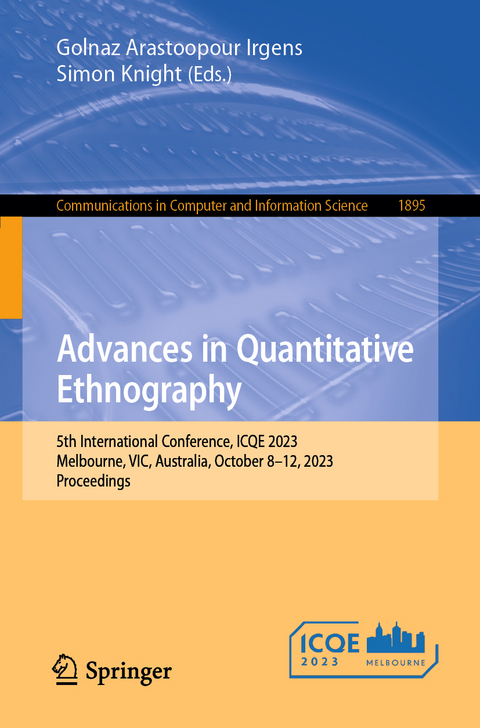
Advances in Quantitative Ethnography
Springer International Publishing (Verlag)
978-3-031-47013-4 (ISBN)
The 33 full papers included in this book were carefully reviewed and selected from 39 submissions. They were organized in topical sections as follows: understanding learners and learning; society, culture, identity, and justice; and advances in QE methodologies.
Understanding Learners and Learning.- Do Learners Appreciate Adaptivity? An Epistemic Network Analysis of How Learners Perceive Adaptive Scaffolding.- Cracking the Code of Learning Gains: Using Ordered Network Analysis to Understand the Influence of Prior Knowledge.- Decoding Player Behavior: An Epistemic Network Analysis of the Reasons for Player Quitting Using Log Data from the Puzzle Game Baba is You.- Impact of Agent Language on Student Language in the Structures of Language Connections.- Characterising Individual-level Collaborative Learning Behaviours using Ordered Network Analysis and Wearable Sensors.- Understanding Group Dynamics During Synchronous Collaborative Problem-solving Activities: An Epistemic Network Approach.- Cultural Impact on a Global Virtual STEM Project.- From We to Me: Moving towards an examination of self identity in an online, global, collaborative, learning environment.- Investigating the Relationship Between Programming Experience and Debugging Behaviors in an Introductory Computer Science Course.- To Ban or Embrace - Students' perceptions towards adopting advanced AI Chatbots in Schools.- Using Epistemic Network Analysis to Explore Flexibility and Development of Termite Fishing Techniques in Nigeria-Cameroon Chimpanzees (Pan troglodytes ellioti).- Society, Culture, Identity, and Justice.- Examining Motivating Language in Commencement Speech Using Epistemic Network Analysis.- Examining the Discourse of Effective Science Communicators Using Epistemic Network Analysis.- Examining Student Conceptualizations of Intersectional Identities Across Global Contexts via Epistemic Network Analysis (ENA).- Asian American Education Literature Before and After Covid-19.- Examining Student Conceptualizations of Intersectional Identities Across Global Contexts via Epistemic Network Analysis (ENA).- Using Epistemic Network Analysisto Understand the Intersectional Experiences of Teachers of Color in White-Dominated Education Institutions (updated).- Conceptualizing Theoretical Frameworks for Post-Colonial Education for Kisii K-12, Kenya.- The Stories We Tell: Uncovering Hidden Narratives in History Textbooks through Epistemic Network Analysis.- Theory and tool-building for a science of dysfunctional political discourse.- Envisioning Latinx Narratives: Exploring Mexican and Honduran Immigrant Perspectives Using Epistemic Networks by Geospatial Location.- Interaction of Diagnostic Criteria in the Narratives of Patients with Borderline Personality Disorder.- Leveraging Epistemic Network Analysis in Monologic Interviews to Explore Cultural Integration In Global Organizations.- Advances in QE Methodologies.- Thin Data, Thick Description: Modeling Socio-Environmental Problem-Solving Trajectories in Localized Land-Use Simulations.- Developing Nursing Students' Practice Readiness with Patient First: A Transmodal Analysis.- Combining Automatic Coding and Instructor Input to Generate ENA Visualizations for Asynchronous Online Discussion.- A Case for (Inter)Action: The Role of Log Data in QE.- Approaches to Code Selection for Epistemic Networks.- Negative Reversion: Toward Intelligent Co-raters for Coding Qualitative Data in Quantitative Ethnography.- Automated Code Discovery via Graph Neural Networks and Generative AI.- A Lightweight Interactive Regex Generator for Qualitative Coding in Quantitative Ethnography.- From nCoder to ChatGPT: From Automated Coding to Refining Human Coding.
| Erscheinungsdatum | 24.10.2023 |
|---|---|
| Reihe/Serie | Communications in Computer and Information Science |
| Zusatzinfo | XVIII, 502 p. 129 illus., 122 illus. in color. |
| Verlagsort | Cham |
| Sprache | englisch |
| Maße | 155 x 235 mm |
| Gewicht | 789 g |
| Themenwelt | Informatik ► Weitere Themen ► Hardware |
| Schlagworte | Artificial Intelligence • Computer Networks • computer programming • Computer systems • computer vision • Correlation Analysis • E-Learning • electric network analysis • Human-Computer Interaction (HCI) • network analysis • Network Protocols • network topology • Signal Processing • User Interfaces |
| ISBN-10 | 3-031-47013-3 / 3031470133 |
| ISBN-13 | 978-3-031-47013-4 / 9783031470134 |
| Zustand | Neuware |
| Haben Sie eine Frage zum Produkt? |
aus dem Bereich


